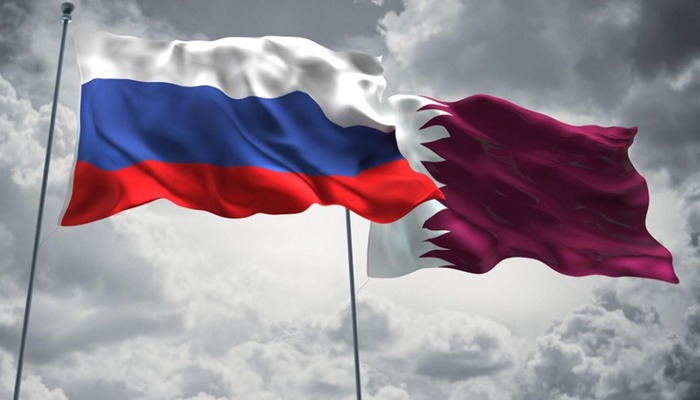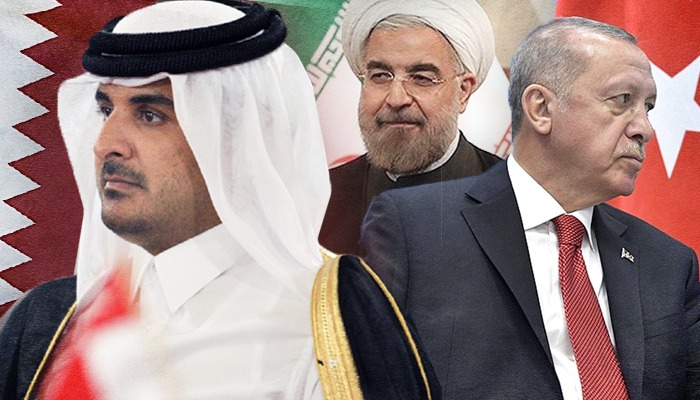Although Qatar is a small country, it plays a prominent role in the international arena. It had, however, failed to play a serious role in the Middle East due to Saudi pressure – however, today, it has become one of the biggest threats to the Kingdom primarily due to Saudi leaderships’ poor decision making.
RELATIONS BETWEEN QATAR AND TURKEY
The emergence of friendly ties between Qatar and Turkey was the first consequence of the June 2017 diplomatic crisis between Qatar and Saudi Arabia. New diplomatic ties between the two countries began in 2011 with the start of the Arab Spring, when they supported the legitimate protests of Muslims and their struggles against dictators in the Middle East and North Africa. Arab Spring leaders took refuge in both of these countries, which led Saudi Arabia, Egypt, the United Arab Emirates (UAE) and Bahrain to confront them and form two opposing coalitions, namely the Saudi Arabia-Egypt-the UAE-Bahrain coalition (Saudi-led coalition) and the Turkey-Qatar alliance. The two coalitions also took dangerous measures, including the military blockade of Qatar and the failed coup against Recep Tayyip Erdoğan in 2016.
Qatar defends #OperationPeaceSpring in Syria as Turkey faces “imminent threat” https://t.co/axTw3jzIJZ
— DAILY SABAH (@DailySabah) October 15, 2019
After 2017, relations between the two countries became such that Turkey started to provide Qatar with military security, while Qatar offered Turkey economic security in return. Doha’s military needs were met via the establishment of a Turkish military base in Qatar, while Turkey’s economic security came from Qatar investing $20 billion in the country at the height of the Ankara-Washington crisis, ultimately preventing the Turkish lira from collapsing. These two powerful actors in the Middle East were able to form a special ideological alliance and complement each other in the international arena.
RELATIONS BETWEEN QATAR AND IRAN
In addition to the close ties between Ankara and Doha, the 2017 Qatar crisis pushed Tehran and Doha to develop friendly relations.
Iran plans much of its actions in the Middle East around curbing the influence of Saudi Arabia, which is why it began to establish close relations with Qatar during the 2017 crisis. By drawing closer to Qatar, Iran managed to significantly weaken Saudi Arabia. Tehran also pursued other goals with their decision, including increasing its influence in the Arabian Peninsula and boosting its economy.
Iran, Qatar discuss ways to boost military cooperation https://t.co/LhoVTarPMZ
— Mehr News Agency (@MehrnewsCom) March 4, 2019
Only six months after the beginning of the 2017 crisis in Qatar, we witnessed a 117% increase in the volume of financial transactions between Tehran and Doha. After providing Qatar with the use of its airlines, Iran was able to establish itself in the Qatari market.
RUSSIA’S ROLE IN FORMING AN ALLIANCE
The Moscow-Ankara-Tehran axis is one of the main political formations that has developed in recent years in the Middle East. After the Syrian crisis and the establishment of a strategic alliance between Iran and Russia in that country, Tehran sought to form a trilateral alliance by relieving the tensions between Moscow and Ankara. The three countries have now been able to sign important trilateral economic and political treaties… however, there are significant disagreements among them militarily, especially in northern Syria.
Russia was probably the first country to see Qatar as the gateway to the Persian Gulf. Moscow was confident that the 2017 crisis would provide the basis for Russia to enter the Gulf markets, although the UAE is also considered one of Moscow’s major targets.

Turkey and Iran have pursued separate but similar goals in their relations with Qatar, whereas Russia’s goals have been far more broad and strategic. Russia believes the Arabian Peninsula is under US dominance, and therefore believes the alliance with Qatar is the best opportunity to gain access to the territory themselves.
Due to its enormous international power and influence, Russia has the ability to bring countries together and form new alliances. Thus, it could very likely bring Turkey, Iran and Qatar, who had confronted each other in the Syrian crisis, into a strategic partnership.
THE US’ ROLE IN OPPOSING THE ALLIANCE WITH QATAR
The US’ role in the Saudi-led coalition (Saudi-Egypt-UAE-Israel) against Qatar is similar to Russia’s role in the Iran-Turkey-Qatar alliance. The United States is one of the world’s largest superpowers and is capable of bringing nations together, even if there are strong differences between them.
As one of the major opponents of the Qatar-Turkey-Iran alliance, the United States has made efforts to prevent Moscow from bringing these nations together but ultimately failed. Qatar is home to one of Washington’s main military bases in the Middle East, which has left them particularly concerned with recent developments; it tried to prevent Turkish troops from entering Qatar but to no avail.
Qatar responds to a question about a US strike on Iran from within its territory https://t.co/7h0j3ojJff pic.twitter.com/Ldn7MYMryd
— MbS NeWs (@MbSNewsEnglish) October 17, 2019
Reportedly, the Al Udeid Air Base in Qatar (again, one of the most important US bases in the Middle East) has been evacuated. This issue can be analyzed from two perspectives.
1: The United States has withdrawn from Qatar.
2: The United States is withdrawing its military hardware from Al Udeid Air Base to launch a military strike.
#Qatar’s Al Udeid Air Base remains America’s most important military facility in the #MiddleEast and is integral to #US led counterterrorism missions #QatarStronger #QatarMovingForward pic.twitter.com/DeLJ1IN4qk
— Qatar Embassy USA (@QatarEmbassyUSA) June 3, 2018
When it comes to Turkey and Syria, Washington has very clearly lost to Moscow… and now, the country is now subject to a third loss. We can predict that the United States will launch a military strike in Qatar which is why it is now withdrawing its troops from the Al Udeid Air Base.
Regardless of which analysis is correct, it is certain that Washington will not simply give up on Qatar. It will do its utmost to pull the country out of the Iran-Turkey alliance, seeing their alliance as a potential platform for Russian influence in the Arabian Peninsula, which would ultimately weaken the US’ position in the Middle East.
QATAR ALLIANCE CONFRONTS SAUDI-LED COALITION
Despite being a small country, Qatar has a special place in the Middle East in terms of energy and economic questions. Its recent closeness with Iran and Turkey has helped the country find its true place after having been ignored over the last few years in the wake of colonial policies by Saudi Arabia.
Through the formation of the ‘Arab NATO’, Saudi Arabia sought to confront Iran and Turkey; however, it unwittingly helped them to unite with Qatar which strengthened their enemies significantly. We must not forget that during the Syrian crisis, Turkey, Iran and Qatar pursued conflicting interests, yet, by making ill-advised decisions in the course of that conflict, Saudi Arabia pushed these former political competitors together.
Militarily, Israel, Egypt, the UAE and Saudi Arabia believe that Turkey is their biggest threat. On the other hand, in terms of hegemony, they consider Iran their major competitor. With Qatar joining the two countries, economic threats were added to the political threats against the Saudi-led coalition (Saudi-Egypt-UAE-Israel). From this perspective, Qatar plays a vital role in countering what has been called the Arab NATO.
On this week’s @MEastMatters, @SanamF24 sits down with @Lolwah_Alkhater:
– “Qatar is working with Japan to de-escalate US-Iran tensions”
– “We believe the Iranians are open to negotiate”
– On #Saudi-led coalition: “the pattern of reckless behaviour in the region needs to stop” pic.twitter.com/vjyvb5g23p— FRANCE 24 English (@France24_en) June 11, 2019
It should also be noted that Iran, Qatar and Russia possess more than half of the world’s gas reserves. This fact alone can prevent those who consume their gas, especially European countries, from entering into conflicts with these three countries. This is one of the biggest concerns that the Saudi-led coalition is grappling with today, as Riyadh is unable to exert pressure on Doha by leveraging international pressure.
Qatar also has a secret trump card that has received little attention: it is located on the path of China’s “Belt and Road Initiative” project, which could be of great benefit to Turkey and Iran. It should also be remembered that, like the Qatari alliance, China is also seeking to weaken US international power. Given the current circumstances, Doha could play a key role in giving an international status to the Qatar-Turkey-Iran alliance against the United States and its regional ally, Saudi Arabia.
When the Saudi rulers ordered the economic blockade of Qatar, they likely did not foresee that their actions would ultimately backfire and end up posing a serious threat to their own interests. By allying with Russia, Iran and Turkey, Qatar has succeeded in resisting Saudi Arabia, thwarting their claims of leadership in the Middle East.

















Leave a Reply